
要讓邁克爾·戴爾講兩句豪言壯語(yǔ)是很困難的事情,即便給他時(shí)間準(zhǔn)備也于事無(wú)補(bǔ),。當(dāng)被問及AI熱潮會(huì)給這家以他名字命名的公司戴爾科技(Dell Technologies)帶來(lái)多大的增長(zhǎng)機(jī)遇時(shí),,這位創(chuàng)始人兼長(zhǎng)期首席執(zhí)行官并沒有給出任何簡(jiǎn)潔有力的準(zhǔn)確描述,,而是陷入了沉思。
他在思考之后說:“感覺這次熱潮的勢(shì)頭跟前幾次一樣大,,而且可能會(huì)更大,。”隨后他補(bǔ)充說:“其實(shí),,可能要大得多,。”他又停頓了一下,,重新思考該如何措辭,,然后給出了一個(gè)最為不確定的結(jié)論:“我也不確定。沒有人能知道,?!?/p>
我們坐在奧斯汀郊區(qū)戴爾科技總部的一間會(huì)議室里,這里3月份的氣溫已經(jīng)升至31攝氏度,。戴爾走了進(jìn)來(lái),,身著深色寬松長(zhǎng)褲和深藍(lán)色粗棉布領(lǐng)扣襯衫(德州人稱之為商務(wù)休閑,四季皆宜),。他剛剛完成了照片拍攝,,能看出來(lái)談不上享受,而是在應(yīng)付,。他并不是反對(duì)自己成為公司的品牌和形象代言人,,畢竟很長(zhǎng)一段時(shí)間以來(lái)都是如此,確切來(lái)說已經(jīng)有40年了,。他依然是戴爾科技最虔誠(chéng)的信仰者,,也是公司最大的股東,他和妻子蘇珊名下持有公司53%的股份,,價(jià)值790億美元,。然而,他在逢場(chǎng)作戲方面并沒有什么天分,,以前也是如此,。事實(shí)上,他似乎在刻意避免給人留下這種印象,,即便在其即將開展這一最偉大的壯舉時(shí)亦是如此,。
與其他科技公司首席執(zhí)行官不一樣的是,戴爾不會(huì)去講一些豪言壯語(yǔ),,也不會(huì)惺惺作態(tài),。他沒有從事什么副業(yè),例如將自己送入外太空,。盡管成年后其所有生活都處于公眾視野當(dāng)中,,但他表現(xiàn)得十分慎重,,頗有分析頭腦,而且?guī)缀跏强桃獗憩F(xiàn)得很平淡,。因此,,對(duì)于生成式AI會(huì)對(duì)其公司帶來(lái)什么影響這個(gè)問題,,他并沒有給出一個(gè)明確的回答,,這一點(diǎn)也就不足為奇了。
不過,,盡管戴爾傾向于回避這個(gè)問題,,市場(chǎng)卻難掩其激動(dòng)之心。就在我們進(jìn)行采訪數(shù)天之前,,2024年3月1日,,當(dāng)戴爾科技公布了超出分析師預(yù)期的營(yíng)收之后,其股價(jià)飆升了38%,,突破了創(chuàng)紀(jì)錄的131美元大關(guān),。這份財(cái)報(bào)讓外界十分看好戴爾不斷增長(zhǎng)的終端科技產(chǎn)品組合的需求,也就是存儲(chǔ)和管理生成式AI應(yīng)用運(yùn)行時(shí)所需海量數(shù)據(jù)組所使用的設(shè)備,。針對(duì)AI優(yōu)化后的服務(wù)器訂單在上一季度增長(zhǎng)了40%,。首席運(yùn)營(yíng)官杰夫·克拉克在公司業(yè)績(jī)發(fā)布會(huì)上曾表示:“我們剛開始接觸擺在眼前的AI機(jī)遇?!?/p>
受此影響的不僅只有戴爾的公司,。由于股價(jià)飆升,邁克爾·戴爾的個(gè)人凈資產(chǎn)據(jù)稱在3月初達(dá)到了1000億美元,,對(duì)于在30歲就成為億萬(wàn)富翁的戴爾來(lái)說,,這依然是一個(gè)顯著的里程碑。
然而,,戴爾對(duì)這一切都處之泰然,。過去幾十年中,面對(duì)一些大起大落,,他始終保持著同樣的波瀾不驚,。他曾經(jīng)帶領(lǐng)公司實(shí)現(xiàn)了多次重大轉(zhuǎn)型。同時(shí),,他展現(xiàn)了一種不可思議的能力——讀懂客戶的需求,,并在正確的時(shí)間做出合適的策略調(diào)整,無(wú)論是弱化PC轉(zhuǎn)而投身服務(wù)器,、感應(yīng)器和存儲(chǔ),,還是在巨額收購(gòu)交易中不顧卡爾·伊坎的強(qiáng)烈反對(duì)而帶領(lǐng)公司私有化時(shí)都是如此。
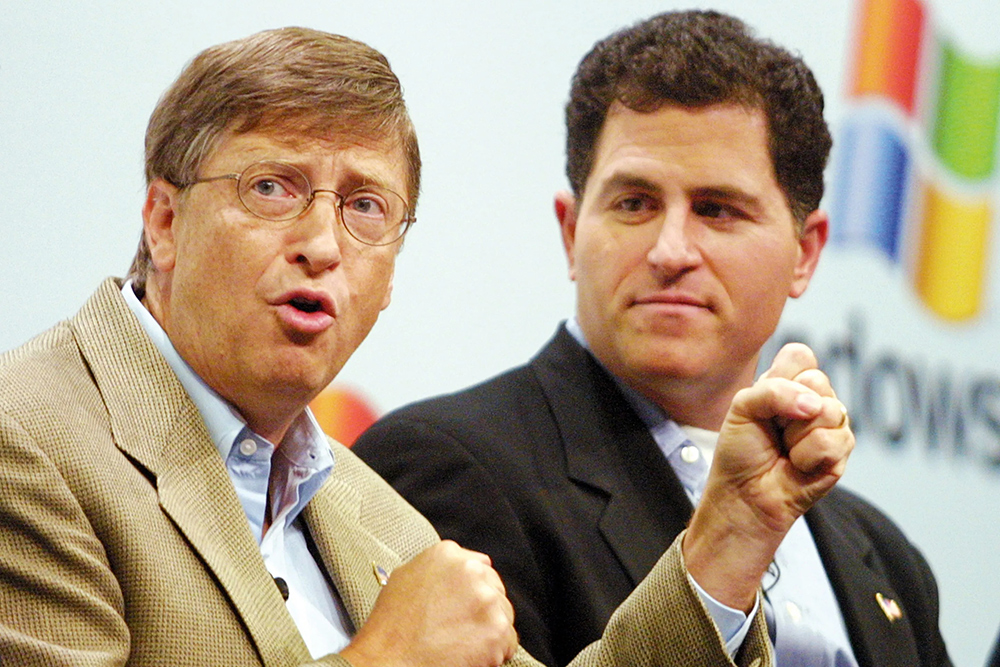
正是得益于這一私有化舉措,,戴爾科技才能去把握當(dāng)前的AI浪潮,。在私有化后的過去五年中,戴爾才真正開啟了銷售筆記本和臺(tái)式電腦之外的多元化之路,。戴爾遠(yuǎn)離了市場(chǎng)對(duì)季度業(yè)績(jī)的癡迷,,轉(zhuǎn)而鞏固和擴(kuò)張了其公司,成為了一家為企業(yè)客戶打造基礎(chǔ)設(shè)施工具的巨頭,。在這一過程中,,他策劃了歷史上最大的一次科技公司交易,以670億美元收購(gòu)數(shù)據(jù)存儲(chǔ)提供商EMC,。
如果戴爾并不是一個(gè)充滿活力,、轟動(dòng)型的演講者,這可能是因?yàn)樗谶^去40年中已經(jīng)養(yǎng)成了傾聽的習(xí)慣,,并通過其分析技能和強(qiáng)烈的好奇心來(lái)發(fā)現(xiàn)其客戶的需求,,然后應(yīng)對(duì)其所在領(lǐng)域的各種波折。他對(duì)我說:“我喜歡花時(shí)間去研究科技,,也愿意與客戶待在一起,。”他補(bǔ)充說,,至少就業(yè)務(wù)而言,,“我真的沒有什么別的愛好?!?/p>
戴爾科技依然在銷售戴爾個(gè)人電腦,;事實(shí)上,公司的大部分營(yíng)收來(lái)自計(jì)算機(jī)業(yè)務(wù),。不過,,如今的戴爾科技與5年前或10年前大不相同,與40年前相比更是如此,。唯一不變的就是戴爾自己,。企業(yè)軟件制造商Salesforce聯(lián)合創(chuàng)始人兼首席執(zhí)行官馬克·貝尼奧夫表示:“他可能是科技行業(yè)歷史上任職時(shí)間最長(zhǎng)的首席執(zhí)行官?!必惸釆W夫在談?wù)摯鳡枙r(shí)表示:“他比我小6個(gè)月,,但我把他看作我的老哥。他在各個(gè)方面都是那么出色,?!?/p>
如果不是其龐大的規(guī)模,人們很難記住戴爾的總部。在朗德羅克的戴爾公司總部坐在戴爾對(duì)面,,“出色”并非是我想到的第一個(gè)詞,。不過,戴爾已經(jīng)打造了一座為99%的世界500強(qiáng)公司提供科技構(gòu)筑材料的帝國(guó),,并樂此不疲,。這些公司在AI新時(shí)代將出現(xiàn)新的需求。如果戴爾能夠精明行事,,那么AI的未來(lái)可能會(huì)讓這位首席執(zhí)行官以及這家曾幾何時(shí)毫無(wú)目標(biāo)的計(jì)算機(jī)生產(chǎn)商,,比以往任何時(shí)候都更討市場(chǎng)喜歡,這一切都將確保他能夠在未來(lái)繼續(xù)掌控公司大權(quán),。
*****
在接受我們采訪之后的上午,,戴爾在其母校得克薩斯大學(xué)奧斯汀分校的一個(gè)醫(yī)療創(chuàng)新峰會(huì)上發(fā)表了演講。(戴爾在這所大學(xué)讀完了兩個(gè)學(xué)期,,然后便輟學(xué)開始全職銷售個(gè)人電腦。)投資者吉姆·布雷耶在戴爾的建議下于2019年從硅谷搬到了奧斯汀,,他在提到這位首席執(zhí)行官時(shí)毫不吝惜贊美之詞,。他說:“邁克爾·戴爾是我合作過的最勇敢的企業(yè)家?!?/p>
戴爾的表現(xiàn)……還不錯(cuò),。(很明顯,公開演講并不是他的舒適區(qū),。)不過,,他表現(xiàn)得很自信,也很堅(jiān)決,。59歲的戴爾依然保持著青春的氣息,,其卷發(fā)僅有淡淡的灰色。從觀眾的反應(yīng)來(lái)看,,很明顯,,戴爾在校園大受歡迎,即便他從未拿到畢業(yè)證,。
在有據(jù)可查的早些年間,,這位古怪、沖動(dòng)的創(chuàng)始人似乎從未出過錯(cuò),。1984年,,作為醫(yī)科大學(xué)預(yù)科生,他便開始在大學(xué)宿舍里搗弄起了電腦,。在19歲那年,,他離開了學(xué)校,并將所有精力放在自己的生意上,。他面臨著其他大得多的競(jìng)爭(zhēng)對(duì)手,,包括IBM和蘋果,,但戴爾開創(chuàng)了新的商業(yè)模式:他的電腦是可以定制的,而且直接面向消費(fèi)者銷售,,砍掉了中間商,。1988年,他帶領(lǐng)戴爾計(jì)算機(jī)上市,,籌集了3000萬(wàn)美元,,并使用這筆資金在全球進(jìn)行擴(kuò)張。在27歲那年,,他成為了《財(cái)富》美國(guó)500強(qiáng)企業(yè)中最年輕的首席執(zhí)行官,。只要個(gè)人電腦的需求在增長(zhǎng),公司的規(guī)模便一直在增長(zhǎng),。
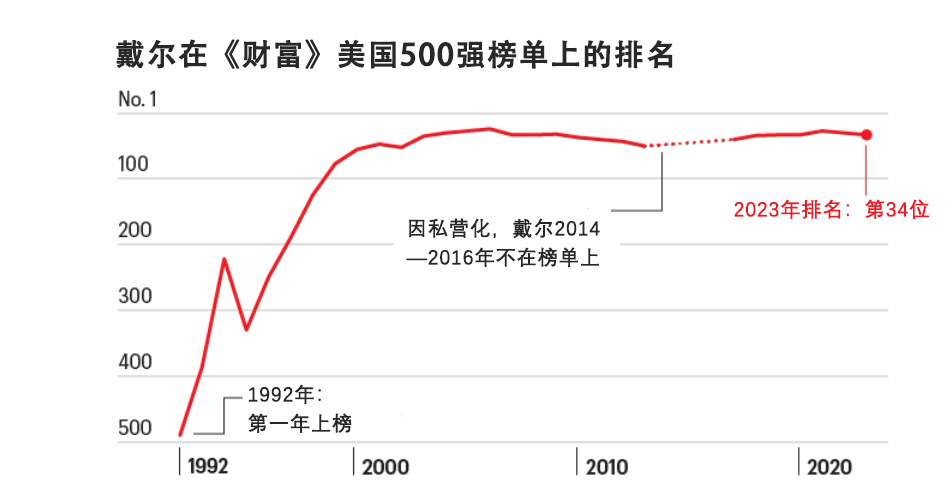
然而,,個(gè)人電腦最終成為了公司的致命弱點(diǎn)。2001年,,戴爾成為了全球領(lǐng)先的電腦制造商,,超越了曾經(jīng)叱咤風(fēng)云的康柏。不過,,其銷量在不久后便開始下滑,。亞洲制造商加入了戰(zhàn)局,為美國(guó)消費(fèi)者提供價(jià)格更低的產(chǎn)品,。在21世紀(jì)00年代末,,智能手機(jī)和平板蜂擁而至,進(jìn)一步放緩了桌面和筆記本的需求,。戴爾曾嘗試進(jìn)軍移動(dòng)領(lǐng)域,,但其產(chǎn)品并不叫座。戴爾的“平板手機(jī)”定位于手機(jī)和筆記本之間的非必要尷尬地帶,,剛面世一年便停產(chǎn)了,。
在此之前,戴爾耗費(fèi)了數(shù)年的時(shí)間嘗試業(yè)務(wù)的多元化,。1995年,,他攜手PowerEdge進(jìn)軍服務(wù)器市場(chǎng),該產(chǎn)品線目前依然存在,,針對(duì)的是那些無(wú)法依靠現(xiàn)有設(shè)備管理海量數(shù)據(jù)的企業(yè),。2006年,公司成立了支持云計(jì)算的業(yè)務(wù)部門,,包括支持“混合云”的工具,,也就是能夠與公共云(第三方托管數(shù)據(jù))進(jìn)行整合的私人云(按客戶保存數(shù)據(jù))。
然而,該業(yè)務(wù)的擴(kuò)張速度還不夠快,,無(wú)法抵消電腦銷量的下滑,。戴爾的股價(jià)一落千丈。2013年,,在個(gè)人電腦營(yíng)收下滑兩年多之后(而且在股價(jià)跌破11美元來(lái)到谷底之后),,戴爾本人決定對(duì)其掌上明珠私有化,因?yàn)樗J(rèn)為讓公司遠(yuǎn)離華爾街逐利的短視行為,,是從長(zhǎng)遠(yuǎn)角度出發(fā)對(duì)公司進(jìn)行重新定位的最佳方式,。
貝尼奧夫?qū)⑦@一交易稱之為戴爾的“神奇壯舉”。不過,,該舉措進(jìn)展的并不順利,,而且十分難堪。戴爾回憶說:“我并不知道此事的難度有多大,。在啟動(dòng)這一進(jìn)程之后,,[我覺得]‘是不是一兩周就能完成?’沒想到耗費(fèi)了8個(gè)月的時(shí)間,?!?/p>
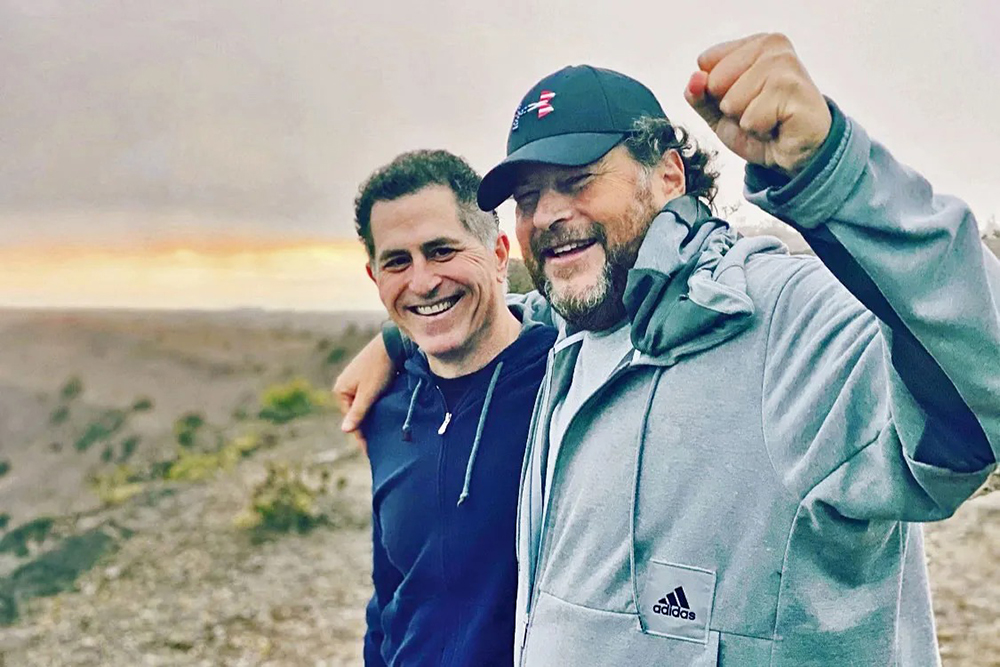
戴爾并不是一個(gè)人在戰(zhàn)斗,。私募股權(quán)公司Silver Lake聯(lián)合首席執(zhí)行官埃貢·德班從一開始就成為了其戰(zhàn)友。這兩位向戴爾的股東提供了一個(gè)他們認(rèn)為還不錯(cuò)的收購(gòu)方案——用股權(quán)和債務(wù)資助的244億美元交易,,是科技行業(yè)歷史上最大的一次杠桿收購(gòu),。然而,公司劫掠者卡爾·伊坎進(jìn)入了人們的視野,,迅速購(gòu)買了公司相當(dāng)大一部分股權(quán),,并索要更高的價(jià)格。在眾人了解這一信息之前,,戴爾和德班已經(jīng)與伊坎打響了戰(zhàn)斗,,因?yàn)橐量步o出了還價(jià)方案,涉及由他來(lái)收購(gòu)公司,,并讓戴爾辭去首席執(zhí)行官職務(wù),。
最終,伊坎做出讓步,,戴爾拿下了交易,。戴爾和德班將其每股收購(gòu)價(jià)格提升了10美分,并向一些股東發(fā)放了特別派息,。2013年10月29日,,戴爾電腦成為了一家私營(yíng)公司,由邁克爾·戴爾和Silver Lake共同所有。
在這個(gè)漫長(zhǎng)的斗爭(zhēng)中,,兩位對(duì)手的個(gè)性可謂是展露無(wú)遺:伊坎通過財(cái)經(jīng)頻道和其他媒體來(lái)闡述其觀點(diǎn),,戴爾則低調(diào)行事。然而在近些年,,戴爾開始公開談?wù)撨@場(chǎng)沖突,。他在2021年出版的自傳《誠(chéng)信為本,無(wú)謂輸贏》(Play Nice But Win)講述了其中一個(gè)場(chǎng)景:戴爾到伊坎家拜訪,,吃了頓普通的烘肉卷晚餐,,試圖達(dá)成共識(shí),但以失敗告終,。盡管戴爾說他并不會(huì)記仇,,但他稱有必要“揭露”伊坎的手段。
十多年之后,,很明顯,,他們并沒有反目成仇。戴爾說:“伊坎的出現(xiàn)是收購(gòu)過程中最難熬的部分,。這是一個(gè)漫長(zhǎng),、痛苦的時(shí)期,這一可怕的局面影響了所有人,?!贝鳡栆廊徽J(rèn)為,伊坎從未真的打算收購(gòu)其公司,,只是希望從交易中賺更多的錢,。在一次電話采訪中,伊坎自己表示,,他的舉措迫使收購(gòu)交易得到了“實(shí)質(zhì)性改善”,。伊坎說:“股東因?yàn)槲叶玫搅烁嗟腻X?!?/p>
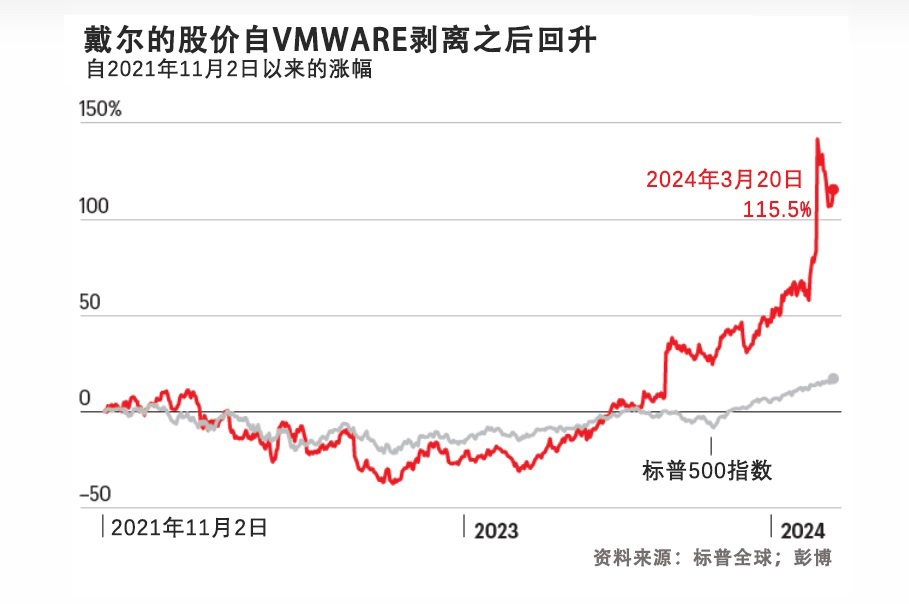
很明顯,,這兩位人士都引用了二戰(zhàn)時(shí)期領(lǐng)導(dǎo)人的話語(yǔ)來(lái)描述其沖突?!皽厮诡D丘吉爾說了句什么話來(lái)著,?”戴爾反問我說,隨即便援引了這位前英國(guó)首相的名言:“縱使前路鋪滿荊棘,,也要繼續(xù)走下去,。”與此同時(shí),,伊坎則引用了富蘭克林·羅斯福在1936年競(jìng)選時(shí)的講話:“戴爾恨我,,但我對(duì)此持歡迎態(tài)度,。”
然而,,雙方的對(duì)決據(jù)稱讓戴爾成為了一個(gè)更好的領(lǐng)導(dǎo)者,。這位首席執(zhí)行官身邊的人士表示,他對(duì)完成這一交易的決心和信念讓公司度過了困難時(shí)期,。德班說:“這場(chǎng)戰(zhàn)斗讓公司內(nèi)部更加親密無(wú)間,。”德班依然是戴爾的密友,,他的公司也是戴爾科技最大的股東之一,。那個(gè)時(shí)期的雇員稱,戴爾與員工之間的關(guān)系比以往任何時(shí)候都更加緊密,,而且與基層的溝通也順暢多了,。
同樣重要的是,戴爾向更廣泛的商界證明,,他是一位有分析頭腦,、果決的首席執(zhí)行官。摩根大通(JPMorgan Chase)首席執(zhí)行官杰米·戴蒙在評(píng)價(jià)戴爾私有化交易時(shí)指出:“戴爾冒了很大的風(fēng)險(xiǎn),,不采取這一舉措的話事情會(huì)簡(jiǎn)單一些,,但他不達(dá)目的不罷休?!痹诿枋龃鳡枙r(shí),,戴蒙提及了“OODA循環(huán)”,這是一個(gè)用來(lái)描述高效決策的軍用術(shù)語(yǔ),,他稱這種方式是科技公司首席執(zhí)行官的執(zhí)掌秘訣,。(OODA是“觀察、導(dǎo)向,、決定、行動(dòng)”四詞的首字母縮寫),。
這種冷靜的頭腦也注定戴爾的愛好少得可憐,。貝尼奧夫?qū)ξ艺f,他的這位朋友最近開始打獵,,用的是弓和箭,。(戴爾公司并未確認(rèn)此事。)貝尼奧夫稱,,戴爾會(huì)捕獵鳥類,,而這種神出鬼沒的目標(biāo)只有在獵手十分冷靜、沒有情緒波動(dòng)而且異常專注時(shí)才能命中,。
*****
戴爾科技首席運(yùn)營(yíng)官杰夫·克拉克是邁克爾·戴爾除創(chuàng)始人之外最親近的人,,他于1987年加入了團(tuán)隊(duì),。在通過視頻會(huì)議與《財(cái)富》交談時(shí),穿著印有紅白藍(lán)“Texas”字樣T恤的克拉克稱,,公司的私有化時(shí)期是其職業(yè)生涯中最快樂的時(shí)光,。克拉克說:“真的是松了一口氣,?!?/p>
退出公開市場(chǎng)意味著戴爾可以大膽地冒險(xiǎn)并投資研發(fā),即便沒有直接收益也無(wú)所謂,。公司可以圍繞向家得寶(Home Depot)和CVS Health等企業(yè)客戶提供各類基礎(chǔ)設(shè)施來(lái)進(jìn)行重新定位,。這些客戶最大的需求越來(lái)越多地涉及其自身不斷積累的海量數(shù)據(jù)。2016年,,戴爾和德班在戴蒙的幫助下上演了另一場(chǎng)金融大戲,,以670億美元的價(jià)格收購(gòu)EMC及其軟件子公司VMware。戴爾稱,,這是一場(chǎng)夢(mèng)寐以求的收購(gòu),。
然而,該交易是一場(chǎng)巨額豪賭,,讓戴爾公司背上了沉重的債務(wù)負(fù)擔(dān),,而且在隨后引發(fā)了動(dòng)蕩。合并后的公司開始再次上市交易,,其股票類別與其在VMware的所有權(quán)權(quán)益掛鉤,。兩年后,公司回購(gòu)了上述股票,,并用新股票門類進(jìn)行了置換,。這一過程中,VMware投資者(包括戴爾的老朋友伊坎)提起訴訟,,稱這一復(fù)雜的交易低估了其股價(jià),,戴爾科技最終以10億美元和解。然而,,收購(gòu)為戴爾的業(yè)務(wù)增添了更廣泛的數(shù)據(jù)存儲(chǔ)和管理資產(chǎn)組合,,無(wú)疑讓公司變得更加強(qiáng)大。
戴爾的公司從不“做市”,,也就是創(chuàng)造此前不存在的需求,。不過,戴爾并不用刻意為之,。多年來(lái)一直關(guān)注戴爾及其競(jìng)爭(zhēng)對(duì)手的分析師帕特里克·摩爾赫德稱:“戴爾的強(qiáng)項(xiàng)在于了解應(yīng)該在什么時(shí)候進(jìn)入市場(chǎng),。他們就在客戶身邊,而且這些客戶都是他們所熟知的客戶,?!迸撂乩锟恕つ柡盏氯缃窠?jīng)營(yíng)著市場(chǎng)研究公司Moor Insights & Strategy,。
這種親密關(guān)系從最初便深深扎根于戴爾,當(dāng)時(shí),,邁克爾·戴爾自己每一次只為一名客戶組裝電腦,。1988年,戴爾寫下了公司的首個(gè)文化規(guī)范清單,,首當(dāng)其沖的便是“提供高品質(zhì)產(chǎn)品和卓越客戶服務(wù)”,。他的盟友稱,他在這一方面的關(guān)注度沒有多少改變,,而且他有一個(gè)中心任務(wù),,就是繼續(xù)開展公司的轉(zhuǎn)型。
在2018年12月28日,,重新命名的戴爾科技破繭而出,,以一種新股票類別在紐交所上市。更名后,,這家公司擺脫了其作為滯后個(gè)人電腦制造商的形象,,而是變成了企業(yè)基礎(chǔ)設(shè)施巨人。事實(shí)證明,,企業(yè)對(duì)基礎(chǔ)設(shè)施的需求要比現(xiàn)在大得多,,而且有可能需要更多的個(gè)人電腦,不過只是有可能,。
*****
回到朗德羅克,,戴爾正嘗試解釋什么是“AI個(gè)人電腦”,以及為什么所有人都想得到一臺(tái)這樣的電腦,?!拔伊辛艘粋€(gè)清單”,他邊說邊站起來(lái)前往辦公室拿起手機(jī),。這位首席執(zhí)行官回來(lái)之后便開始逐一介紹各種功能,。
他解釋說,它擁有適時(shí)的基于人工智能的翻譯,,以及一個(gè)名為“圈中搜索”的功能,,能夠讓電腦用戶選出某個(gè)詞或某句話,然后計(jì)算機(jī)就會(huì)提供與之相關(guān)的更多背景信息,。它還有“生成式AI編輯”,可以協(xié)助任何類型的寫作或內(nèi)容創(chuàng)作,。戴爾承認(rèn),,以他的專長(zhǎng)還不足以預(yù)見客戶最終會(huì)用這些電腦來(lái)干什么?!暗艺J(rèn)為,,人們會(huì)找到有創(chuàng)意的用法,,而且各大公司也希望自己能夠提升其雇員的生產(chǎn)力?!?/p>
事實(shí)上,,戴爾從其早期筆記本定制業(yè)務(wù)中吸取的經(jīng)驗(yàn)依然適用于AI時(shí)代:關(guān)鍵是要足夠的靈活,并借此來(lái)滿足客戶的需求,。貝恩咨詢公司(Bain & Co.)董事長(zhǎng)奧里特·加迪耶什表示:“戴爾如今的競(jìng)爭(zhēng)優(yōu)勢(shì)在于,,公司可以按照你在AI領(lǐng)域的幾乎所有需求,來(lái)提供定制式服務(wù),。它具有靈活性,。”奧里特從事了數(shù)十年的咨詢工作,,而且是戴爾的追隨者,。
科技行業(yè)內(nèi)外的企業(yè)客戶已經(jīng)在尋求終端機(jī)器——既能儲(chǔ)存又能對(duì)生成式AI應(yīng)用收到的數(shù)據(jù)進(jìn)行分析。在這個(gè)大型平臺(tái)創(chuàng)造者OpenAI和谷歌正在競(jìng)相競(jìng)爭(zhēng)企業(yè)客戶之時(shí),,戴爾科技并不用擔(dān)心誰(shuí)是最終贏家,。其科技“堆棧”無(wú)需了解不同類型的生成式AI,,就像其云產(chǎn)品始終兼容混合云,、私人云和公共云策略一樣。與云端化趨勢(shì)一樣,,戴爾預(yù)計(jì)AI領(lǐng)域會(huì)出現(xiàn)一個(gè)普遍特征,;所有公司,無(wú)論打造或部署了何種AI技術(shù),,都希望掌握數(shù)據(jù)存儲(chǔ)硬件的控制權(quán),。
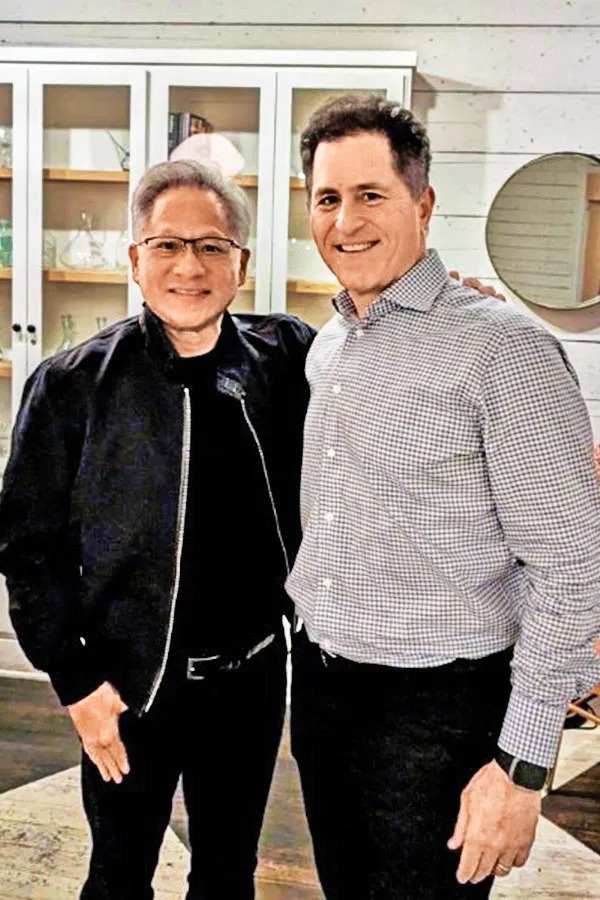
誠(chéng)然,,戴爾并不知道生成式AI會(huì)像現(xiàn)在這樣呈現(xiàn)爆炸式發(fā)展;他將這一功勞歸功于杰夫·克拉克,,后者制定了公司大部分的AI路線圖,。然而,戴爾在很久前就曾琢磨過,,全身心地投入數(shù)據(jù)基礎(chǔ)設(shè)施是戴爾科技在未來(lái)立足的最佳出路,。Sliver Lake的德班稱,結(jié)果,,“為了挖這座AI金礦,,他不僅提供了鎬和鏟,還提供了食宿,?!?/p>
戴爾科技公司的人工智能歷程尚處于初期,。即便增速很快,戴爾的AI服務(wù)器產(chǎn)品僅占其業(yè)務(wù)的一小部分,。然而,,大多數(shù)金融分析師似乎十分看好公司的未來(lái)。甚至有人希望這一AI浪潮將迅速推高人們對(duì)電腦的需求,,具體來(lái)說應(yīng)該是AI電腦,。因?yàn)椋瑢?duì)處理器有著更高性能需求的不僅僅只有數(shù)據(jù)中心(服務(wù)器和存儲(chǔ)系統(tǒng)負(fù)責(zé)處理各大公司的信息),,同時(shí)還有消費(fèi)者和員工與之互動(dòng)所需的桌面端和筆記本端,。
今年2月,戴爾科技公司宣布推出其首個(gè)Latitude人工智能電腦生產(chǎn)線,,它看起來(lái)就是一個(gè)普通電腦,,但其中安裝了一個(gè)名為神經(jīng)處理器的小部件,它是承擔(dān)生成式AI工作的關(guān)鍵,。戴爾并非是看好這一領(lǐng)域的唯一企業(yè),,惠普和聯(lián)想也發(fā)布了類似的產(chǎn)品。不過,,我們并不清楚其需求何時(shí)才能起飛,。彭博行業(yè)研究(Bloomberg Intelligence)分析師寫道,“銷量和發(fā)貨量在2024年可能會(huì)讓投資者感到失望,,但有望在2025年帶來(lái)更大的影響,。”
即便是戴爾也承認(rèn),,需求的增長(zhǎng)需要一定的時(shí)間,。盡管如此,戴爾表示:“如果你是某家公司的電腦維護(hù)負(fù)責(zé)人,,你最不愿看到的就是,,一部分電腦無(wú)法從事用戶需要它們從事的工作。我確實(shí)認(rèn)為會(huì)出現(xiàn)新一輪的需求,?!?/p>
*****
得州大學(xué)創(chuàng)新大樓的最頂層依然是空的,這座新的大樓最初的用途是初創(chuàng)中心,。然而,,人們只要朝窗外看一看,靈感就會(huì)如潮水般涌來(lái),。人們?cè)谛蕾p360度奧斯汀天際線景色的同時(shí)也會(huì)發(fā)現(xiàn),,幾乎所有的方向都存在吊車和施工。
得州大學(xué)校長(zhǎng)杰·哈特澤爾帶我參觀了這個(gè)地方,并指出了所有地標(biāo),,包括那座以該校最出名的輟學(xué)生名字命名的大樓。邁克爾·戴爾并沒有成為醫(yī)生,,但他的名字卻列于其母校醫(yī)學(xué)院,、大學(xué)的教學(xué)醫(yī)院以及兒科研究中心的發(fā)名冊(cè)上。(還有奧斯汀的猶太社區(qū)中心,。)
哈特澤爾表示:“當(dāng)我們談?wù)撘粋€(gè)大學(xué)應(yīng)該培養(yǎng)什么樣的人,,以及人們?yōu)槭裁磻?yīng)該來(lái)此就讀時(shí),戴爾就是典范,?!彼Q贊戴爾不僅是得州大學(xué)畢業(yè)生的一位首要雇主,同時(shí)還幫助大范圍改善了奧斯汀的科技生態(tài)系統(tǒng),。多年來(lái),,從Meta到蘋果這樣的科技公司已經(jīng)在奧斯汀設(shè)立了辦事處。像Vista Equity Partners和太平洋投資管理公司(Pimco)以及吉姆·布雷耶這樣的投資者也都在這里安營(yíng)扎寨,。得州大學(xué)最近迎來(lái)了首批就讀全新人工智能碩士項(xiàng)目的學(xué)生,。
戴爾是休斯敦人,他從未想過將總部搬離得州,,即便有人建議他將總部遷至硅谷時(shí)亦是如此,。奧斯汀市長(zhǎng)科克·沃森在接受電話采訪時(shí)對(duì)我說:“在他的幫助下,奧斯汀才有了如今的知名度,。如果邁克爾·戴爾離開奧斯汀,,那么整個(gè)城市將變得完全不同?!?/p>
戴爾在奧斯汀之外的城市亦留下了足跡,。在任何時(shí)候,戴爾夫婦于1999年創(chuàng)建的邁克爾和蘇珊·戴爾基金會(huì)(Michael & Susan Dell Foundation)在全球都擁有800個(gè)活躍項(xiàng)目,。這些項(xiàng)目專注于教育,、培訓(xùn)和健康創(chuàng)新,以幫助生活于貧困中的兒童,。(戴爾夫婦最近又向基金會(huì)捐贈(zèng)了36億美元,,使其總捐贈(zèng)額達(dá)到了52億美元。)戴爾稱,,他每年在基金會(huì)上的精力在逐漸增加,,同時(shí)也會(huì)更多地過問家族理財(cái)室的工作,后者致力于投資房地產(chǎn)開發(fā)和酒店公司等,。
這些工作在未來(lái)是否會(huì)交由其妻子打理,?戴爾下個(gè)階段的任務(wù)可能會(huì)十分漫長(zhǎng):即便在領(lǐng)導(dǎo)戴爾公司40年之后,戴爾依然很年輕,59歲,。然而,,一想到自己要承擔(dān)當(dāng)前工作(執(zhí)掌這個(gè)以其名字命名的公司)之外的職責(zé),他似乎會(huì)感到難受,。當(dāng)被問及是否會(huì)在未來(lái)20年繼續(xù)執(zhí)掌戴爾公司時(shí),,戴爾稱還沒有想過那么久遠(yuǎn)的事情,但也沒有其他特別想做的事情,。最后,,他總算講了一句類似于名言的話語(yǔ):“我之前曾說過,即便不在了,,我依然會(huì)心系戴爾,。”
*****
漫長(zhǎng)而又曲折的道路
邁克爾戴爾的公司于1984年設(shè)立,,是一家致力于賣電腦的有限公司,,僅此而已。幾次重大轉(zhuǎn)型幫助公司不斷發(fā)展,,并讓戴爾不僅能夠緊跟趨勢(shì),,還成為了行業(yè)主導(dǎo)者。
1995
戴爾計(jì)算機(jī)發(fā)布了第一代PowerEdge企業(yè)服務(wù)器,,這是該公司首次嘗試向企業(yè)銷售數(shù)據(jù)存儲(chǔ)產(chǎn)品,。當(dāng)時(shí),戴爾計(jì)算機(jī)已經(jīng)是一家《財(cái)富》美國(guó)500強(qiáng)公司,。
2006
戴爾進(jìn)入了云時(shí)代,,宣布設(shè)立新業(yè)務(wù)部門,向客戶提供云產(chǎn)品和服務(wù),。很長(zhǎng)一段時(shí)間以后,,需求才逐漸顯現(xiàn)。
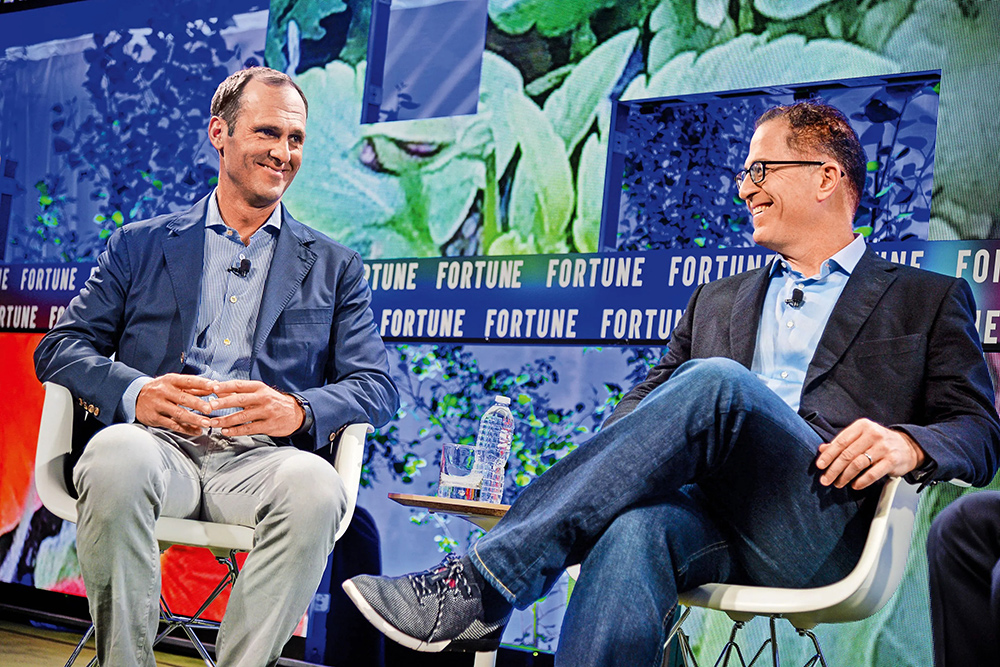
2013
邁克爾·戴爾與私募股權(quán)公司Silver Lake埃貢·德班(見上圖,左邊是戴爾)實(shí)現(xiàn)了戴爾的私有化,,以便重新讓公司專注于企業(yè)數(shù)據(jù)基礎(chǔ)設(shè)施需求,。
2016
戴爾以670億美元的價(jià)格收購(gòu)EMC及其在VMware的股權(quán),是當(dāng)時(shí)最大的科技并購(gòu)交易,,也使得戴爾的數(shù)據(jù)存儲(chǔ)和管理資產(chǎn)組合得到大幅擴(kuò)張,。
2023
戴爾科技發(fā)布了一系列針對(duì)生成式AI進(jìn)行優(yōu)化的基礎(chǔ)設(shè)施產(chǎn)品,包括服務(wù)器和存儲(chǔ)產(chǎn)品,。
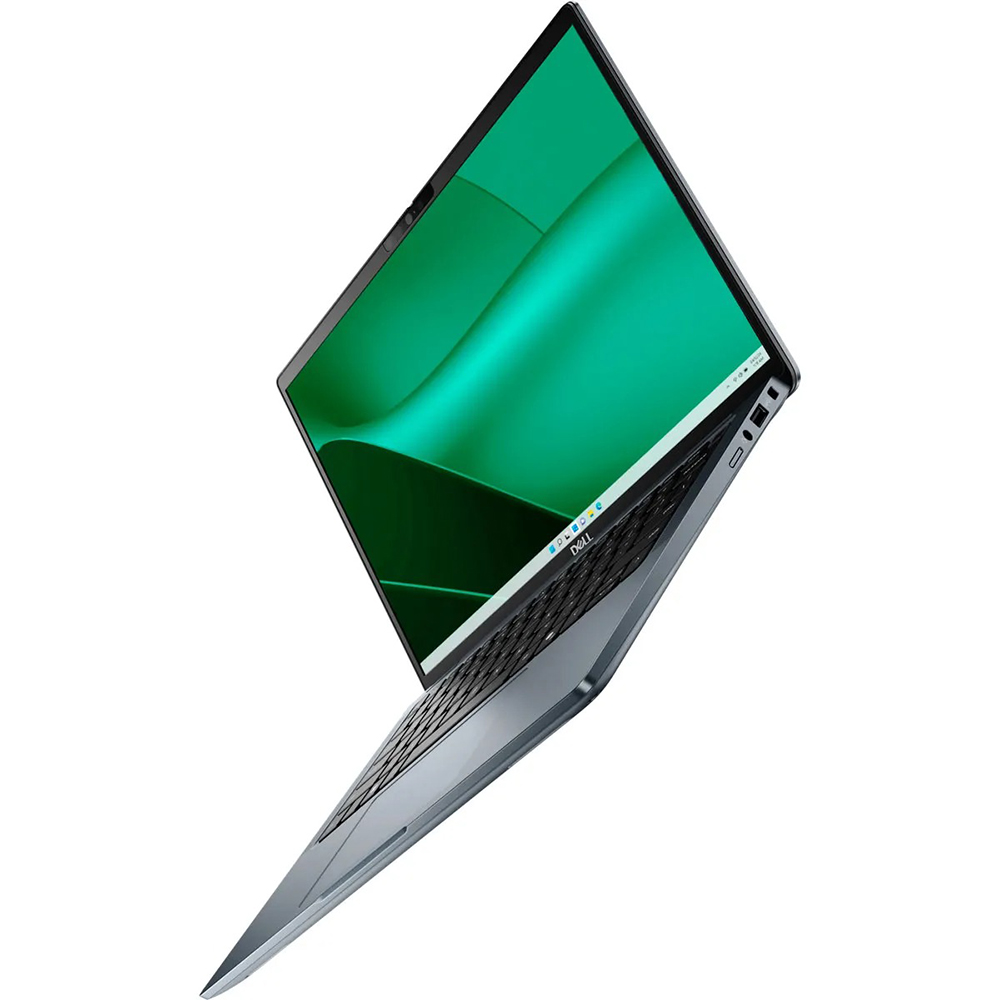
2024
今年2月,,公司宣布推出其AI電腦,,其中安裝了用于處理AI工作的“神經(jīng)處理器”。3月初,,戴爾科技的股價(jià)創(chuàng)下歷史新高,。(財(cái)富中文網(wǎng))
譯者:馮豐
審校:夏林
要讓邁克爾·戴爾講兩句豪言壯語(yǔ)是很困難的事情,即便給他時(shí)間準(zhǔn)備也于事無(wú)補(bǔ),。當(dāng)被問及AI熱潮會(huì)給這家以他名字命名的公司戴爾科技(Dell Technologies)帶來(lái)多大的增長(zhǎng)機(jī)遇時(shí),這位創(chuàng)始人兼長(zhǎng)期首席執(zhí)行官并沒有給出任何簡(jiǎn)潔有力的準(zhǔn)確描述,,而是陷入了沉思,。
他在思考之后說:“感覺這次熱潮的勢(shì)頭跟前幾次一樣大,而且可能會(huì)更大,?!彪S后他補(bǔ)充說:“其實(shí),可能要大得多,?!彼滞nD了一下,重新思考該如何措辭,,然后給出了一個(gè)最為不確定的結(jié)論:“我也不確定,。沒有人能知道?!?/p>
我們坐在奧斯汀郊區(qū)戴爾科技總部的一間會(huì)議室里,,這里3月份的氣溫已經(jīng)升至31攝氏度。戴爾走了進(jìn)來(lái),,身著深色寬松長(zhǎng)褲和深藍(lán)色粗棉布領(lǐng)扣襯衫(德州人稱之為商務(wù)休閑,,四季皆宜)。他剛剛完成了照片拍攝,,能看出來(lái)談不上享受,,而是在應(yīng)付。他并不是反對(duì)自己成為公司的品牌和形象代言人,,畢竟很長(zhǎng)一段時(shí)間以來(lái)都是如此,,確切來(lái)說已經(jīng)有40年了。他依然是戴爾科技最虔誠(chéng)的信仰者,,也是公司最大的股東,,他和妻子蘇珊名下持有公司53%的股份,價(jià)值790億美元,。然而,,他在逢場(chǎng)作戲方面并沒有什么天分,以前也是如此。事實(shí)上,,他似乎在刻意避免給人留下這種印象,,即便在其即將開展這一最偉大的壯舉時(shí)亦是如此。
與其他科技公司首席執(zhí)行官不一樣的是,,戴爾不會(huì)去講一些豪言壯語(yǔ),,也不會(huì)惺惺作態(tài)。他沒有從事什么副業(yè),,例如將自己送入外太空,。盡管成年后其所有生活都處于公眾視野當(dāng)中,但他表現(xiàn)得十分慎重,,頗有分析頭腦,,而且?guī)缀跏强桃獗憩F(xiàn)得很平淡。因此,,對(duì)于生成式AI會(huì)對(duì)其公司帶來(lái)什么影響這個(gè)問題,,他并沒有給出一個(gè)明確的回答,這一點(diǎn)也就不足為奇了,。
不過,,盡管戴爾傾向于回避這個(gè)問題,市場(chǎng)卻難掩其激動(dòng)之心,。就在我們進(jìn)行采訪數(shù)天之前,,2024年3月1日,當(dāng)戴爾科技公布了超出分析師預(yù)期的營(yíng)收之后,,其股價(jià)飆升了38%,,突破了創(chuàng)紀(jì)錄的131美元大關(guān)。這份財(cái)報(bào)讓外界十分看好戴爾不斷增長(zhǎng)的終端科技產(chǎn)品組合的需求,,也就是存儲(chǔ)和管理生成式AI應(yīng)用運(yùn)行時(shí)所需海量數(shù)據(jù)組所使用的設(shè)備,。針對(duì)AI優(yōu)化后的服務(wù)器訂單在上一季度增長(zhǎng)了40%。首席運(yùn)營(yíng)官杰夫·克拉克在公司業(yè)績(jī)發(fā)布會(huì)上曾表示:“我們剛開始接觸擺在眼前的AI機(jī)遇,?!?/p>
受此影響的不僅只有戴爾的公司。由于股價(jià)飆升,,邁克爾·戴爾的個(gè)人凈資產(chǎn)據(jù)稱在3月初達(dá)到了1000億美元,,對(duì)于在30歲就成為億萬(wàn)富翁的戴爾來(lái)說,這依然是一個(gè)顯著的里程碑,。
然而,,戴爾對(duì)這一切都處之泰然。過去幾十年中,,面對(duì)一些大起大落,,他始終保持著同樣的波瀾不驚,。他曾經(jīng)帶領(lǐng)公司實(shí)現(xiàn)了多次重大轉(zhuǎn)型。同時(shí),,他展現(xiàn)了一種不可思議的能力——讀懂客戶的需求,,并在正確的時(shí)間做出合適的策略調(diào)整,無(wú)論是弱化PC轉(zhuǎn)而投身服務(wù)器,、感應(yīng)器和存儲(chǔ),,還是在巨額收購(gòu)交易中不顧卡爾·伊坎的強(qiáng)烈反對(duì)而帶領(lǐng)公司私有化時(shí)都是如此。
正是得益于這一私有化舉措,,戴爾科技才能去把握當(dāng)前的AI浪潮,。在私有化后的過去五年中,戴爾才真正開啟了銷售筆記本和臺(tái)式電腦之外的多元化之路,。戴爾遠(yuǎn)離了市場(chǎng)對(duì)季度業(yè)績(jī)的癡迷,,轉(zhuǎn)而鞏固和擴(kuò)張了其公司,成為了一家為企業(yè)客戶打造基礎(chǔ)設(shè)施工具的巨頭,。在這一過程中,他策劃了歷史上最大的一次科技公司交易,,以670億美元收購(gòu)數(shù)據(jù)存儲(chǔ)提供商EMC,。
如果戴爾并不是一個(gè)充滿活力、轟動(dòng)型的演講者,,這可能是因?yàn)樗谶^去40年中已經(jīng)養(yǎng)成了傾聽的習(xí)慣,,并通過其分析技能和強(qiáng)烈的好奇心來(lái)發(fā)現(xiàn)其客戶的需求,然后應(yīng)對(duì)其所在領(lǐng)域的各種波折,。他對(duì)我說:“我喜歡花時(shí)間去研究科技,,也愿意與客戶待在一起?!彼a(bǔ)充說,,至少就業(yè)務(wù)而言,“我真的沒有什么別的愛好,?!?/p>
戴爾科技依然在銷售戴爾個(gè)人電腦;事實(shí)上,,公司的大部分營(yíng)收來(lái)自計(jì)算機(jī)業(yè)務(wù),。不過,如今的戴爾科技與5年前或10年前大不相同,,與40年前相比更是如此,。唯一不變的就是戴爾自己。企業(yè)軟件制造商Salesforce聯(lián)合創(chuàng)始人兼首席執(zhí)行官馬克·貝尼奧夫表示:“他可能是科技行業(yè)歷史上任職時(shí)間最長(zhǎng)的首席執(zhí)行官,?!必惸釆W夫在談?wù)摯鳡枙r(shí)表示:“他比我小6個(gè)月,,但我把他看作我的老哥。他在各個(gè)方面都是那么出色,?!?/p>
如果不是其龐大的規(guī)模,人們很難記住戴爾的總部,。在朗德羅克的戴爾公司總部坐在戴爾對(duì)面,,“出色”并非是我想到的第一個(gè)詞。不過,,戴爾已經(jīng)打造了一座為99%的世界500強(qiáng)公司提供科技構(gòu)筑材料的帝國(guó),,并樂此不疲。這些公司在AI新時(shí)代將出現(xiàn)新的需求,。如果戴爾能夠精明行事,,那么AI的未來(lái)可能會(huì)讓這位首席執(zhí)行官以及這家曾幾何時(shí)毫無(wú)目標(biāo)的計(jì)算機(jī)生產(chǎn)商,比以往任何時(shí)候都更討市場(chǎng)喜歡,,這一切都將確保他能夠在未來(lái)繼續(xù)掌控公司大權(quán),。
*****
在接受我們采訪之后的上午,戴爾在其母校得克薩斯大學(xué)奧斯汀分校的一個(gè)醫(yī)療創(chuàng)新峰會(huì)上發(fā)表了演講,。(戴爾在這所大學(xué)讀完了兩個(gè)學(xué)期,,然后便輟學(xué)開始全職銷售個(gè)人電腦。)投資者吉姆·布雷耶在戴爾的建議下于2019年從硅谷搬到了奧斯汀,,他在提到這位首席執(zhí)行官時(shí)毫不吝惜贊美之詞,。他說:“邁克爾·戴爾是我合作過的最勇敢的企業(yè)家?!?/p>
戴爾的表現(xiàn)……還不錯(cuò),。(很明顯,公開演講并不是他的舒適區(qū),。)不過,,他表現(xiàn)得很自信,也很堅(jiān)決,。59歲的戴爾依然保持著青春的氣息,,其卷發(fā)僅有淡淡的灰色。從觀眾的反應(yīng)來(lái)看,,很明顯,,戴爾在校園大受歡迎,即便他從未拿到畢業(yè)證,。
在有據(jù)可查的早些年間,,這位古怪、沖動(dòng)的創(chuàng)始人似乎從未出過錯(cuò),。1984年,,作為醫(yī)科大學(xué)預(yù)科生,,他便開始在大學(xué)宿舍里搗弄起了電腦。在19歲那年,,他離開了學(xué)校,,并將所有精力放在自己的生意上。他面臨著其他大得多的競(jìng)爭(zhēng)對(duì)手,,包括IBM和蘋果,,但戴爾開創(chuàng)了新的商業(yè)模式:他的電腦是可以定制的,而且直接面向消費(fèi)者銷售,,砍掉了中間商,。1988年,他帶領(lǐng)戴爾計(jì)算機(jī)上市,,籌集了3000萬(wàn)美元,,并使用這筆資金在全球進(jìn)行擴(kuò)張。在27歲那年,,他成為了《財(cái)富》美國(guó)500強(qiáng)企業(yè)中最年輕的首席執(zhí)行官,。只要個(gè)人電腦的需求在增長(zhǎng),公司的規(guī)模便一直在增長(zhǎng),。
然而,,個(gè)人電腦最終成為了公司的致命弱點(diǎn)。2001年,,戴爾成為了全球領(lǐng)先的電腦制造商,超越了曾經(jīng)叱咤風(fēng)云的康柏,。不過,,其銷量在不久后便開始下滑。亞洲制造商加入了戰(zhàn)局,,為美國(guó)消費(fèi)者提供價(jià)格更低的產(chǎn)品,。在21世紀(jì)00年代末,智能手機(jī)和平板蜂擁而至,,進(jìn)一步放緩了桌面和筆記本的需求,。戴爾曾嘗試進(jìn)軍移動(dòng)領(lǐng)域,但其產(chǎn)品并不叫座,。戴爾的“平板手機(jī)”定位于手機(jī)和筆記本之間的非必要尷尬地帶,,剛面世一年便停產(chǎn)了。
在此之前,,戴爾耗費(fèi)了數(shù)年的時(shí)間嘗試業(yè)務(wù)的多元化,。1995年,他攜手PowerEdge進(jìn)軍服務(wù)器市場(chǎng),,該產(chǎn)品線目前依然存在,針對(duì)的是那些無(wú)法依靠現(xiàn)有設(shè)備管理海量數(shù)據(jù)的企業(yè),。2006年,,公司成立了支持云計(jì)算的業(yè)務(wù)部門,包括支持“混合云”的工具,,也就是能夠與公共云(第三方托管數(shù)據(jù))進(jìn)行整合的私人云(按客戶保存數(shù)據(jù))。
然而,,該業(yè)務(wù)的擴(kuò)張速度還不夠快,,無(wú)法抵消電腦銷量的下滑。戴爾的股價(jià)一落千丈,。2013年,,在個(gè)人電腦營(yíng)收下滑兩年多之后(而且在股價(jià)跌破11美元來(lái)到谷底之后),戴爾本人決定對(duì)其掌上明珠私有化,,因?yàn)樗J(rèn)為讓公司遠(yuǎn)離華爾街逐利的短視行為,,是從長(zhǎng)遠(yuǎn)角度出發(fā)對(duì)公司進(jìn)行重新定位的最佳方式。
貝尼奧夫?qū)⑦@一交易稱之為戴爾的“神奇壯舉”,。不過,,該舉措進(jìn)展的并不順利,而且十分難堪,。戴爾回憶說:“我并不知道此事的難度有多大,。在啟動(dòng)這一進(jìn)程之后,[我覺得]‘是不是一兩周就能完成,?’沒想到耗費(fèi)了8個(gè)月的時(shí)間,。”
戴爾并不是一個(gè)人在戰(zhàn)斗,。私募股權(quán)公司Silver Lake聯(lián)合首席執(zhí)行官埃貢·德班從一開始就成為了其戰(zhàn)友,。這兩位向戴爾的股東提供了一個(gè)他們認(rèn)為還不錯(cuò)的收購(gòu)方案——用股權(quán)和債務(wù)資助的244億美元交易,是科技行業(yè)歷史上最大的一次杠桿收購(gòu),。然而,,公司劫掠者卡爾·伊坎進(jìn)入了人們的視野,迅速購(gòu)買了公司相當(dāng)大一部分股權(quán),,并索要更高的價(jià)格,。在眾人了解這一信息之前,戴爾和德班已經(jīng)與伊坎打響了戰(zhàn)斗,,因?yàn)橐量步o出了還價(jià)方案,,涉及由他來(lái)收購(gòu)公司,并讓戴爾辭去首席執(zhí)行官職務(wù),。
最終,,伊坎做出讓步,戴爾拿下了交易,。戴爾和德班將其每股收購(gòu)價(jià)格提升了10美分,,并向一些股東發(fā)放了特別派息,。2013年10月29日,戴爾電腦成為了一家私營(yíng)公司,,由邁克爾·戴爾和Silver Lake共同所有,。
在這個(gè)漫長(zhǎng)的斗爭(zhēng)中,兩位對(duì)手的個(gè)性可謂是展露無(wú)遺:伊坎通過財(cái)經(jīng)頻道和其他媒體來(lái)闡述其觀點(diǎn),,戴爾則低調(diào)行事,。然而在近些年,戴爾開始公開談?wù)撨@場(chǎng)沖突,。他在2021年出版的自傳《誠(chéng)信為本,,無(wú)謂輸贏》(Play Nice But Win)講述了其中一個(gè)場(chǎng)景:戴爾到伊坎家拜訪,吃了頓普通的烘肉卷晚餐,,試圖達(dá)成共識(shí),,但以失敗告終。盡管戴爾說他并不會(huì)記仇,,但他稱有必要“揭露”伊坎的手段,。
十多年之后,很明顯,,他們并沒有反目成仇,。戴爾說:“伊坎的出現(xiàn)是收購(gòu)過程中最難熬的部分。這是一個(gè)漫長(zhǎng),、痛苦的時(shí)期,,這一可怕的局面影響了所有人?!贝鳡栆廊徽J(rèn)為,,伊坎從未真的打算收購(gòu)其公司,只是希望從交易中賺更多的錢,。在一次電話采訪中,伊坎自己表示,,他的舉措迫使收購(gòu)交易得到了“實(shí)質(zhì)性改善”,。伊坎說:“股東因?yàn)槲叶玫搅烁嗟腻X?!?/p>
很明顯,,這兩位人士都引用了二戰(zhàn)時(shí)期領(lǐng)導(dǎo)人的話語(yǔ)來(lái)描述其沖突?!皽厮诡D丘吉爾說了句什么話來(lái)著,?”戴爾反問我說,隨即便援引了這位前英國(guó)首相的名言:“縱使前路鋪滿荊棘,,也要繼續(xù)走下去,?!迸c此同時(shí),伊坎則引用了富蘭克林·羅斯福在1936年競(jìng)選時(shí)的講話:“戴爾恨我,,但我對(duì)此持歡迎態(tài)度,。”
然而,,雙方的對(duì)決據(jù)稱讓戴爾成為了一個(gè)更好的領(lǐng)導(dǎo)者,。這位首席執(zhí)行官身邊的人士表示,他對(duì)完成這一交易的決心和信念讓公司度過了困難時(shí)期,。德班說:“這場(chǎng)戰(zhàn)斗讓公司內(nèi)部更加親密無(wú)間,。”德班依然是戴爾的密友,,他的公司也是戴爾科技最大的股東之一,。那個(gè)時(shí)期的雇員稱,戴爾與員工之間的關(guān)系比以往任何時(shí)候都更加緊密,,而且與基層的溝通也順暢多了,。
同樣重要的是,戴爾向更廣泛的商界證明,,他是一位有分析頭腦,、果決的首席執(zhí)行官。摩根大通(JPMorgan Chase)首席執(zhí)行官杰米·戴蒙在評(píng)價(jià)戴爾私有化交易時(shí)指出:“戴爾冒了很大的風(fēng)險(xiǎn),,不采取這一舉措的話事情會(huì)簡(jiǎn)單一些,,但他不達(dá)目的不罷休?!痹诿枋龃鳡枙r(shí),,戴蒙提及了“OODA循環(huán)”,這是一個(gè)用來(lái)描述高效決策的軍用術(shù)語(yǔ),,他稱這種方式是科技公司首席執(zhí)行官的執(zhí)掌秘訣,。(OODA是“觀察、導(dǎo)向,、決定,、行動(dòng)”四詞的首字母縮寫)。
這種冷靜的頭腦也注定戴爾的愛好少得可憐,。貝尼奧夫?qū)ξ艺f,,他的這位朋友最近開始打獵,用的是弓和箭,。(戴爾公司并未確認(rèn)此事,。)貝尼奧夫稱,戴爾會(huì)捕獵鳥類,而這種神出鬼沒的目標(biāo)只有在獵手十分冷靜,、沒有情緒波動(dòng)而且異常專注時(shí)才能命中,。
*****
戴爾科技首席運(yùn)營(yíng)官杰夫·克拉克是邁克爾·戴爾除創(chuàng)始人之外最親近的人,他于1987年加入了團(tuán)隊(duì),。在通過視頻會(huì)議與《財(cái)富》交談時(shí),,穿著印有紅白藍(lán)“Texas”字樣T恤的克拉克稱,公司的私有化時(shí)期是其職業(yè)生涯中最快樂的時(shí)光,??死苏f:“真的是松了一口氣?!?/p>
退出公開市場(chǎng)意味著戴爾可以大膽地冒險(xiǎn)并投資研發(fā),,即便沒有直接收益也無(wú)所謂。公司可以圍繞向家得寶(Home Depot)和CVS Health等企業(yè)客戶提供各類基礎(chǔ)設(shè)施來(lái)進(jìn)行重新定位,。這些客戶最大的需求越來(lái)越多地涉及其自身不斷積累的海量數(shù)據(jù),。2016年,戴爾和德班在戴蒙的幫助下上演了另一場(chǎng)金融大戲,,以670億美元的價(jià)格收購(gòu)EMC及其軟件子公司VMware,。戴爾稱,這是一場(chǎng)夢(mèng)寐以求的收購(gòu),。
然而,,該交易是一場(chǎng)巨額豪賭,讓戴爾公司背上了沉重的債務(wù)負(fù)擔(dān),,而且在隨后引發(fā)了動(dòng)蕩,。合并后的公司開始再次上市交易,其股票類別與其在VMware的所有權(quán)權(quán)益掛鉤,。兩年后,,公司回購(gòu)了上述股票,并用新股票門類進(jìn)行了置換,。這一過程中,,VMware投資者(包括戴爾的老朋友伊坎)提起訴訟,稱這一復(fù)雜的交易低估了其股價(jià),,戴爾科技最終以10億美元和解,。然而,收購(gòu)為戴爾的業(yè)務(wù)增添了更廣泛的數(shù)據(jù)存儲(chǔ)和管理資產(chǎn)組合,,無(wú)疑讓公司變得更加強(qiáng)大,。
戴爾的公司從不“做市”,,也就是創(chuàng)造此前不存在的需求,。不過,戴爾并不用刻意為之。多年來(lái)一直關(guān)注戴爾及其競(jìng)爭(zhēng)對(duì)手的分析師帕特里克·摩爾赫德稱:“戴爾的強(qiáng)項(xiàng)在于了解應(yīng)該在什么時(shí)候進(jìn)入市場(chǎng),。他們就在客戶身邊,,而且這些客戶都是他們所熟知的客戶?!迸撂乩锟恕つ柡盏氯缃窠?jīng)營(yíng)著市場(chǎng)研究公司Moor Insights & Strategy,。
這種親密關(guān)系從最初便深深扎根于戴爾,當(dāng)時(shí),,邁克爾·戴爾自己每一次只為一名客戶組裝電腦,。1988年,戴爾寫下了公司的首個(gè)文化規(guī)范清單,,首當(dāng)其沖的便是“提供高品質(zhì)產(chǎn)品和卓越客戶服務(wù)”,。他的盟友稱,他在這一方面的關(guān)注度沒有多少改變,,而且他有一個(gè)中心任務(wù),,就是繼續(xù)開展公司的轉(zhuǎn)型。
在2018年12月28日,,重新命名的戴爾科技破繭而出,,以一種新股票類別在紐交所上市。更名后,,這家公司擺脫了其作為滯后個(gè)人電腦制造商的形象,,而是變成了企業(yè)基礎(chǔ)設(shè)施巨人。事實(shí)證明,,企業(yè)對(duì)基礎(chǔ)設(shè)施的需求要比現(xiàn)在大得多,,而且有可能需要更多的個(gè)人電腦,不過只是有可能,。
*****
回到朗德羅克,,戴爾正嘗試解釋什么是“AI個(gè)人電腦”,以及為什么所有人都想得到一臺(tái)這樣的電腦,?!拔伊辛艘粋€(gè)清單”,他邊說邊站起來(lái)前往辦公室拿起手機(jī),。這位首席執(zhí)行官回來(lái)之后便開始逐一介紹各種功能,。
他解釋說,它擁有適時(shí)的基于人工智能的翻譯,,以及一個(gè)名為“圈中搜索”的功能,,能夠讓電腦用戶選出某個(gè)詞或某句話,然后計(jì)算機(jī)就會(huì)提供與之相關(guān)的更多背景信息,。它還有“生成式AI編輯”,,可以協(xié)助任何類型的寫作或內(nèi)容創(chuàng)作。戴爾承認(rèn),以他的專長(zhǎng)還不足以預(yù)見客戶最終會(huì)用這些電腦來(lái)干什么,?!暗艺J(rèn)為,人們會(huì)找到有創(chuàng)意的用法,,而且各大公司也希望自己能夠提升其雇員的生產(chǎn)力,。”
事實(shí)上,,戴爾從其早期筆記本定制業(yè)務(wù)中吸取的經(jīng)驗(yàn)依然適用于AI時(shí)代:關(guān)鍵是要足夠的靈活,,并借此來(lái)滿足客戶的需求。貝恩咨詢公司(Bain & Co.)董事長(zhǎng)奧里特·加迪耶什表示:“戴爾如今的競(jìng)爭(zhēng)優(yōu)勢(shì)在于,,公司可以按照你在AI領(lǐng)域的幾乎所有需求,,來(lái)提供定制式服務(wù)。它具有靈活性,?!眾W里特從事了數(shù)十年的咨詢工作,而且是戴爾的追隨者,。
科技行業(yè)內(nèi)外的企業(yè)客戶已經(jīng)在尋求終端機(jī)器——既能儲(chǔ)存又能對(duì)生成式AI應(yīng)用收到的數(shù)據(jù)進(jìn)行分析,。在這個(gè)大型平臺(tái)創(chuàng)造者OpenAI和谷歌正在競(jìng)相競(jìng)爭(zhēng)企業(yè)客戶之時(shí),戴爾科技并不用擔(dān)心誰(shuí)是最終贏家,。其科技“堆?!睙o(wú)需了解不同類型的生成式AI,就像其云產(chǎn)品始終兼容混合云,、私人云和公共云策略一樣,。與云端化趨勢(shì)一樣,戴爾預(yù)計(jì)AI領(lǐng)域會(huì)出現(xiàn)一個(gè)普遍特征,;所有公司,,無(wú)論打造或部署了何種AI技術(shù),都希望掌握數(shù)據(jù)存儲(chǔ)硬件的控制權(quán),。
誠(chéng)然,,戴爾并不知道生成式AI會(huì)像現(xiàn)在這樣呈現(xiàn)爆炸式發(fā)展;他將這一功勞歸功于杰夫·克拉克,,后者制定了公司大部分的AI路線圖,。然而,戴爾在很久前就曾琢磨過,,全身心地投入數(shù)據(jù)基礎(chǔ)設(shè)施是戴爾科技在未來(lái)立足的最佳出路,。Sliver Lake的德班稱,結(jié)果,,“為了挖這座AI金礦,,他不僅提供了鎬和鏟,,還提供了食宿?!?/p>
戴爾科技公司的人工智能歷程尚處于初期。即便增速很快,,戴爾的AI服務(wù)器產(chǎn)品僅占其業(yè)務(wù)的一小部分,。然而,大多數(shù)金融分析師似乎十分看好公司的未來(lái),。甚至有人希望這一AI浪潮將迅速推高人們對(duì)電腦的需求,,具體來(lái)說應(yīng)該是AI電腦。因?yàn)?,?duì)處理器有著更高性能需求的不僅僅只有數(shù)據(jù)中心(服務(wù)器和存儲(chǔ)系統(tǒng)負(fù)責(zé)處理各大公司的信息),,同時(shí)還有消費(fèi)者和員工與之互動(dòng)所需的桌面端和筆記本端。
今年2月,,戴爾科技公司宣布推出其首個(gè)Latitude人工智能電腦生產(chǎn)線,,它看起來(lái)就是一個(gè)普通電腦,但其中安裝了一個(gè)名為神經(jīng)處理器的小部件,,它是承擔(dān)生成式AI工作的關(guān)鍵,。戴爾并非是看好這一領(lǐng)域的唯一企業(yè),惠普和聯(lián)想也發(fā)布了類似的產(chǎn)品,。不過,,我們并不清楚其需求何時(shí)才能起飛。彭博行業(yè)研究(Bloomberg Intelligence)分析師寫道,,“銷量和發(fā)貨量在2024年可能會(huì)讓投資者感到失望,,但有望在2025年帶來(lái)更大的影響?!?/p>
即便是戴爾也承認(rèn),,需求的增長(zhǎng)需要一定的時(shí)間。盡管如此,,戴爾表示:“如果你是某家公司的電腦維護(hù)負(fù)責(zé)人,,你最不愿看到的就是,一部分電腦無(wú)法從事用戶需要它們從事的工作,。我確實(shí)認(rèn)為會(huì)出現(xiàn)新一輪的需求,。”
*****
得州大學(xué)創(chuàng)新大樓的最頂層依然是空的,,這座新的大樓最初的用途是初創(chuàng)中心,。然而,人們只要朝窗外看一看,,靈感就會(huì)如潮水般涌來(lái),。人們?cè)谛蕾p360度奧斯汀天際線景色的同時(shí)也會(huì)發(fā)現(xiàn),,幾乎所有的方向都存在吊車和施工。
得州大學(xué)校長(zhǎng)杰·哈特澤爾帶我參觀了這個(gè)地方,,并指出了所有地標(biāo),,包括那座以該校最出名的輟學(xué)生名字命名的大樓。邁克爾·戴爾并沒有成為醫(yī)生,,但他的名字卻列于其母校醫(yī)學(xué)院,、大學(xué)的教學(xué)醫(yī)院以及兒科研究中心的發(fā)名冊(cè)上。(還有奧斯汀的猶太社區(qū)中心,。)
哈特澤爾表示:“當(dāng)我們談?wù)撘粋€(gè)大學(xué)應(yīng)該培養(yǎng)什么樣的人,,以及人們?yōu)槭裁磻?yīng)該來(lái)此就讀時(shí),戴爾就是典范,?!彼Q贊戴爾不僅是得州大學(xué)畢業(yè)生的一位首要雇主,同時(shí)還幫助大范圍改善了奧斯汀的科技生態(tài)系統(tǒng),。多年來(lái),,從Meta到蘋果這樣的科技公司已經(jīng)在奧斯汀設(shè)立了辦事處。像Vista Equity Partners和太平洋投資管理公司(Pimco)以及吉姆·布雷耶這樣的投資者也都在這里安營(yíng)扎寨,。得州大學(xué)最近迎來(lái)了首批就讀全新人工智能碩士項(xiàng)目的學(xué)生,。
戴爾是休斯敦人,他從未想過將總部搬離得州,,即便有人建議他將總部遷至硅谷時(shí)亦是如此,。奧斯汀市長(zhǎng)科克·沃森在接受電話采訪時(shí)對(duì)我說:“在他的幫助下,奧斯汀才有了如今的知名度,。如果邁克爾·戴爾離開奧斯汀,,那么整個(gè)城市將變得完全不同?!?/p>
戴爾在奧斯汀之外的城市亦留下了足跡,。在任何時(shí)候,戴爾夫婦于1999年創(chuàng)建的邁克爾和蘇珊·戴爾基金會(huì)(Michael & Susan Dell Foundation)在全球都擁有800個(gè)活躍項(xiàng)目,。這些項(xiàng)目專注于教育,、培訓(xùn)和健康創(chuàng)新,以幫助生活于貧困中的兒童,。(戴爾夫婦最近又向基金會(huì)捐贈(zèng)了36億美元,,使其總捐贈(zèng)額達(dá)到了52億美元。)戴爾稱,,他每年在基金會(huì)上的精力在逐漸增加,,同時(shí)也會(huì)更多地過問家族理財(cái)室的工作,后者致力于投資房地產(chǎn)開發(fā)和酒店公司等,。
這些工作在未來(lái)是否會(huì)交由其妻子打理,?戴爾下個(gè)階段的任務(wù)可能會(huì)十分漫長(zhǎng):即便在領(lǐng)導(dǎo)戴爾公司40年之后,,戴爾依然很年輕,59歲,。然而,,一想到自己要承擔(dān)當(dāng)前工作(執(zhí)掌這個(gè)以其名字命名的公司)之外的職責(zé),他似乎會(huì)感到難受,。當(dāng)被問及是否會(huì)在未來(lái)20年繼續(xù)執(zhí)掌戴爾公司時(shí),,戴爾稱還沒有想過那么久遠(yuǎn)的事情,但也沒有其他特別想做的事情,。最后,他總算講了一句類似于名言的話語(yǔ):“我之前曾說過,,即便不在了,,我依然會(huì)心系戴爾?!?/p>
*****
漫長(zhǎng)而又曲折的道路
邁克爾戴爾的公司于1984年設(shè)立,,是一家致力于賣電腦的有限公司,僅此而已,。幾次重大轉(zhuǎn)型幫助公司不斷發(fā)展,,并讓戴爾不僅能夠緊跟趨勢(shì),還成為了行業(yè)主導(dǎo)者,。
1995
戴爾計(jì)算機(jī)發(fā)布了第一代PowerEdge企業(yè)服務(wù)器,,這是該公司首次嘗試向企業(yè)銷售數(shù)據(jù)存儲(chǔ)產(chǎn)品。當(dāng)時(shí),,戴爾計(jì)算機(jī)已經(jīng)是一家《財(cái)富》美國(guó)500強(qiáng)公司,。
2006
戴爾進(jìn)入了云時(shí)代,宣布設(shè)立新業(yè)務(wù)部門,,向客戶提供云產(chǎn)品和服務(wù),。很長(zhǎng)一段時(shí)間以后,需求才逐漸顯現(xiàn),。
2013
邁克爾·戴爾與私募股權(quán)公司Silver Lake埃貢·德班(見上圖,,左邊是戴爾)實(shí)現(xiàn)了戴爾的私有化,以便重新讓公司專注于企業(yè)數(shù)據(jù)基礎(chǔ)設(shè)施需求,。
2016
戴爾以670億美元的價(jià)格收購(gòu)EMC及其在VMware的股權(quán),,是當(dāng)時(shí)最大的科技并購(gòu)交易,也使得戴爾的數(shù)據(jù)存儲(chǔ)和管理資產(chǎn)組合得到大幅擴(kuò)張,。
2023
戴爾科技發(fā)布了一系列針對(duì)生成式AI進(jìn)行優(yōu)化的基礎(chǔ)設(shè)施產(chǎn)品,,包括服務(wù)器和存儲(chǔ)產(chǎn)品。
2024
今年2月,,公司宣布推出其AI電腦,,其中安裝了用于處理AI工作的“神經(jīng)處理器”,。3月初,戴爾科技的股價(jià)創(chuàng)下歷史新高,。(財(cái)富中文網(wǎng))
譯者:馮豐
審校:夏林
It’s hard to get a splashy sound bite out of Michael Dell, even if you tee him up for one. When asked how big a growth opportunity the AI wave could be for his namesake company, Dell Technologies, the founder and longtime chief executive doesn’t offer up any pithy one-liners but instead ruminates in real time.
“It feels every bit as big as previous waves, but probably bigger,” he says, pondering the question, and then adds, “You know, maybe quite a bit bigger.” He takes another brief pause, reconsiders his own words, and delivers a most inconclusive conclusion: “I don’t know for sure. Nobody knows.”
We’re seated in a conference room at Dell Technologies’ headquarters just outside Austin, where the temperature has hit 88°?F in early March. Dressed in dark slacks and a navy blue denim button-down (Texan for business casual, no matter the season), Dell has just emerged from a photo shoot that he tolerated but clearly didn’t relish. It’s not that he isn’t on board with being the name and face of his company. That’s been true for a while—40 years, to be exact. He remains Dell Technologies’ biggest believer—and biggest shareholder, with 53% of the $79 billion company’s stock under his or his wife Susan’s name. But he’s not a natural-born showman. Never was. In fact, he seems to go out of his way to not put on a performance—even as he’s embarking on what could be his greatest act yet.
Unlike some other tech CEOs, Dell doesn’t do bombastic declarations or colorful antics; he doesn’t have a side hustle that involves blasting himself into outer space. Despite having spent his entire adult life in the public eye, he is measured, analytical, and almost intentionally unexciting. So his reluctance to put a ceiling, or even a floor, on what generative AI could mean for his company is not surprising.
But while Dell may prefer to hedge, the market isn’t hiding its exuberance. Just a few days before our interview, on March 1, Dell Technologies’ share price leaped 38%, hitting an all-time high above $131 after the company reported earnings that beat analyst expectations. The announcement generated plenty of excitement about demand for Dell’s growing portfolio of back-end tech products, the kind required for storing and managing the massive datasets needed to run—you guessed it—generative AI applications. Orders for AI-optimized servers were up 40% in the most recent quarter. As chief operating officer Jeff Clarke said in the company’s earnings release, “We’ve just started to touch the AI opportunities ahead of us.”
It’s not just Dell’s company that’s been buoyed by the buzz. As a result of the massive rise in the stock, Michael Dell’s personal net worth reportedly hit the $100?billion mark in early March—a notable milestone even for a man who became a billionaire at the tender age of 30.
But none of this seems to rock Dell’s world. Over the decades, he’s maintained the same steady demeanor through exhilarating highs and harrowing lows. Along the way, he’s steered his company through multiple major pivots. And he’s showed an uncanny ability to read his customers’ needs and make the right strategic change at the right time, whether de-emphasizing PCs in favor of servers, sensors, and storage, or taking the company private—over the heated opposition of Carl Icahn—in a mammoth buyout.
That privatization maneuver is precisely what positioned the company to capitalize on the current AI boom. Over the five years that it was privately held, Dell was able to truly diversify from selling laptops and desktops. Away from the market’s obsession with quarterly earnings, Dell consolidated and expanded his company, creating a behemoth provider of infrastructure tools for corporate customers. Along the way, he engineered what was then the biggest tech deal in history, the $67?billion acquisition of data storage provider EMC.
If Dell isn’t a dynamic, headline-making speaker, it may be because he’s built this four-decade run on listening—deploying his analytical skills and deep curiosity to recognize what his customers need and to navigate his industry’s twists and turns. “I love spending time on the technology, and I love spending time with our customers,” he tells me. And at least where business is concerned, he adds, “I don’t really love anything else.”
Dell Technologies still sells Dell PCs; in fact, computers make up the majority of its revenue. But today it’s a company vastly different from what it was five or 10 years ago—let alone 40. The one constant? Dell himself. “This is probably the longest-sitting CEO in the tech industry,” says Marc Benioff, cofounder and CEO of enterprise-software maker Salesforce and a longtime friend. “He’s six months younger than I am, but I view him as an older brother,” Benioff says of Dell. “He’s a phenomenon in every possible way.”
Sitting across from Dell at his HQ in Round Rock, a corporate campus that’s forgettable except for its sheer size, “phenomenon” isn’t the first word that comes to mind. But Dell has built—and hung on to—an empire that now provides the technological building blocks for 99% of Fortune?500 companies, most of which will have new needs in this new era of AI. If he plays his cards right, the next chapter of the story could make both the CEO and his once-flailing PC maker more relevant than ever, all but ensuring he’ll stay at the helm for years to come.
*****
The morning after our interview, Dell is speaking on a panel at a health care innovation summit at the University of Texas at Austin, his alma mater. (Dell finished two semesters before dropping out to devote himself to selling PCs full-time.) Investor Jim Breyer, who relocated to Austin from Silicon Valley in 2019 at the Dells’ suggestion, introduces the CEO with glowing superlatives. “Michael Dell is the most courageous entrepreneur I’ve ever worked with,” he gushes.
Dell’s performance is?…?just fine. (It’s clear that public speaking is not his happy place.) Still, he comes across as confident and purposeful. At 59, Dell retains a youthful bearing, his curly hair only tinged by gray. And from the audience reaction, it’s clear Dell’s the big man on campus, even if he never graduated.
In his well-documented early days, the nerdy but gutsy founder could seemingly do no wrong. In 1984, as a premed freshman, he started tinkering with computers in his UT dorm room. By age 19, he had left school and turned all of his attention to his business. He faced other, much bigger competitors, including IBM and Apple. But Dell pioneered a new way of doing business: His computers were built to order, and he sold them directly to consumers, cutting out the middleman. In 1988 he took Dell Computer public, raising $30 million and using the capital to expand globally. At age 27, he became the youngest CEO on the Fortune 500. And the company just kept growing—as long as demand for PCs was on the rise.
But PCs would prove to be the company’s Achilles’ heel. In 2001, Dell became the world’s leading computer maker, surpassing the once-mighty Compaq. But sales soon began to decline. Asian manufacturers had entered the fray, offering cheaper products to American consumers. And by the late 2000s, smartphones and tablets had swarmed the market, slowing demand for desktops and laptops even more. The company tried to jump on the mobile bandwagon, but its efforts were ill-received: Dell’s “phablet,” a product that sat in the unnecessary purgatory between a phone and a tablet, was discontinued after just one year.
By then, Dell had been trying for years to diversify. In 1995 he entered the server market with the PowerEdge, a product line that still exists—designed for enterprises that were amassing far more data than they could manage with their existing equipment. In 2006, the company launched a business unit to support cloud computing, including tools to power “hybrid clouds”—private clouds (which keep data on a customer’s premises) that can integrate with public ones (where data is hosted by a third party).
But this expansion wasn’t happening fast enough to offset declines in PC sales, and investors hammered Dell’s shares. In 2013, after more than two years of falling PC revenue (and after the stock price bottomed at under $11), Dell decided to take his baby private—hypothesizing that shielding the company from Wall Street’s short-term focus on profitability was the best way to reset for the long term.
Benioff refers to the deal as Dell’s “magic trick.” But the maneuver was anything but slick and graceful. “I had no idea how difficult it was going to be,” Dell recalls. “When it started, [I thought], ‘Is this like a one-week thing or two-week thing?’ I didn’t know it was going to be an eight-month thing.”
Dell wasn’t in it alone. Egon Durban, co-CEO of private equity firm Silver Lake, was his partner from the get-go. The two presented Dell shareholders with what they thought was a good offer, a $24.4 billion deal financed by a mix of equity and debt—the largest leveraged buyout in tech-industry history. But then corporate raider Carl Icahn entered the picture, snapping up a sizable chunk of the company’s shares and agitating for a more generous offer. Before they knew it, Dell and Durban were going to war, fighting Icahn as he made a counteroffer that involved buying the company himself—and ousting Dell as CEO.
Eventually, Icahn got concessions, and Dell got his deal. Dell and Durban increased their offer by 10 cents a share and threw in a special dividend for some shareholders. And on Oct. 29, 2013, Dell Computer became a privately held company, owned by Michael Dell and Silver Lake.
During the lengthy feud, the antagonists stayed true to their personalities: Icahn took to CNBC and other outlets to spread his narrative, while Dell lay low. But in recent years, Dell has spoken openly about the clash. His 2021 memoir, Play Nice But Win, opens with a scene in which Dell goes to Icahn’s house for a dinner of mediocre meatloaf, in a (failed) attempt to find common ground. Though Dell says he doesn’t hold grudges, he also says he felt a need to “expose” Icahn’s tactics.
More than 10 years later, it’s clear there’s no love lost between them. “Icahn showing up was the hardest part,” Dell says. “It was a long, painful period where everyone was subjected to this horrible situation.” Dell maintains that Icahn never really planned to buy his company but simply wanted to squeeze more out of the deal. For his part, Icahn, in a phone interview, says that his actions forced a “meaningful improvement” of the buyout. “The shareholders got a lot more money because of me,” says Icahn.
Tellingly, both men quote World War II–era leaders to describe their conflict. “What’s that Winston Churchill quote?” Dell asks me rhetorically, invoking the former British prime minister: “If you’re going through hell, keep going.” Icahn, meanwhile, puts his own paraphrasing spin on a 1936 campaign speech by Franklin D. Roosevelt: “Dell hates me—and I welcome his hatred.”
Still, the trials arguably made Dell a better leader. Those close to the CEO say that his determination and belief in the deal carried the enterprise through a rough patch. “Relationships are forged on the battlefield,” says Durban, who remains close to Dell and whose firm is one of the company’s largest shareholders. Employees from that era say Dell became more connected than ever to his workforce, and even better about communication with the rank and file.
Just as important, Dell proved himself to a wider swath of the business world as an analytical, decisive chief executive. “He took a large risk, which is easier not to do,” Jamie Dimon, the CEO of JPMorgan Chase, says of Dell’s deal. “But he stuck to his guns.” Describing Dell, Dimon invokes the “OODA loop,” a military acronym for efficient decision-making that he says is a secret sauce for the tech CEO. (OODA stands for “observe, orient, decide, act.”)
That kind of coolheadedness also characterizes Dell’s very, very few hobbies. Benioff tells me that his friend recently took up hunting with a bow and arrow. (Dell’s company won’t confirm this.) Dell hunts for birds, Benioff says—the kind of elusive target you can hit only when you’re calm, unemotional, and utterly focused.
*****
Jeff Clarke, Dell Technologies’ COO, is the closest person Michael Dell has to a cofounder, having joined his team in 1987. Speaking to Fortune via videoconference, Clarke—dressed in a red, white, and blue T-shirt that simply says “TEXAS”—refers to the company’s private-company era as one of the most fun periods of his career. “It was liberating,” says Clarke.
Being out of the public market meant that Dell could make big bets and invest in R&D, even if the payoff wasn’t immediate. The company could rebuild itself around providing all things infrastructure for corporate customers like Home Depot and CVS Health, whose greatest needs increasingly revolved around the growing mountains of data they were accumulating. In 2016, Dell and Durban—with Dimon’s help—orchestrated another financial feat, the $67 billion purchase of EMC and its software subsidiary VMware. The acquisition was “something we had dreamed about doing,” Dell says.
Still, the deal was an expensive bet that saddled the business with a heavy debt load—and it created hassles down the road. The merged company started trading publicly again under a share class that tracked its ownership interest in VMware; two years later, it bought those shares back and replaced them with a new share class. Along the way, some VMware investors (including, briefly, Dell’s old buddy Icahn) sued, arguing that the complex deal undervalued their shares, and Dell Technologies eventually paid a $1 billion settlement. Still, the acquisition added an even broader data-storage and management portfolio to Dell’s arsenal, making the company indisputably stronger.
Dell’s company has never been a “market maker,” a company that creates demand for something that didn’t previously exist. But it hasn’t had to be. “What Dell’s been good at is knowing the right time to get into a market,” says Patrick Moorhead, an analyst who has covered Dell and its competitors for years and now runs Moor Insights & Strategy. “They’re so close to their customers that they just know.”
That closeness was embedded at Dell from the earliest days, when Michael Dell himself was building PCs for one customer at a time. In 1988 Dell wrote the company’s first Culture Code, with “Provide high-quality products and excellent customer service” at the top of the list. His focus hasn’t changed much, his allies say, and it’s been central to his ability to keep transforming the company.
On Dec. 28, 2018, the reorganized, renamed Dell Technologies emerged fully from its cocoon, trading on the NYSE under a new share class. In its metamorphosis, the company had all but shed its image as a lagging PC maker, refashioning itself as an enterprise infrastructure giant. And enterprises, it turned out, were about to need a whole lot more infrastructure—and maybe, just maybe, more PCs.
*****
Back in Round Rock, Dell is trying to explain what an “AI PC” is, and why anyone would want one. “I have a list,” he says as he gets up to grab his phone from his office. The CEO comes back and proceeds to rattle off a catalog of capabilities.
There’s real-time, AI-powered translation, he explains, and a feature called “circle to search,” which enables PC users to highlight a word or line, which the computer will then provide more context and information for. There’s also “generative AI editing,” which can assist with any kind of writing or content creation. What customers actually end up using these machines for, Dell admits, is beyond his expertise to foresee. “But I believe that people will figure out creative uses and that companies will want to have the capability to make their people more productive.”
In fact, Dell’s lessons from its earliest days of customizing laptops still apply in the AI era: The key is to be flexible enough to meet customers’ demands. “The competitive advantage for Dell today is that it offers services you can tailor to almost every need in AI,” says Orit Gadiesh, the chairman of Bain & Co. and a decades-long consultant and confidante of Dell’s. “It’s not a fixed thing.”
Corporate customers in and outside tech are already clamoring for back-end machines that can both house and make sense of the data that feeds into generative AI applications. At a time when huge platform creators like OpenAI and Google are competing for corporate clients, Dell Technologies doesn’t have to worry about who wins: Its tech “stack” is agnostic to different flavors of generative AI, just as its cloud offerings have always accommodated hybrid, private, and public cloud?strategies. And just as with the move to the cloud, Dell is counting on one common denominator with AI: that all companies, regardless of which AI applications they build or deploy, will want control over the hardware where the relevant data is stored.
To be sure, Dell didn’t know that the generative AI explosion would happen when it did; he credits Jeff Clarke with devising much of the company’s AI road map. But he calculated long ago that going all in on data infrastructure was the best way to position his company for the future. As a result, “he’s not just providing the picks and shovels, but also housing and food and beverages for the AI gold mine,” says Silver Lake’s Durban.
It’s still early days for Dell Technologies’ AI story. Fast as it’s growing, Dell’s AI server products account for just a tiny fraction of its business. But most financial analysts seem bullish about what’s to come. There’s even hope that the AI craze will jump-start demand for PCs—AI PCs, to be precise. The thinking is that the need for increased processing power won’t just be on the data-center side (where servers and storage systems handle companies’ information), but also on the desktops and laptops that consumers and workers interact with.
In February, Dell Technologies announced its first line of Latitude AI PCs, which look like normal computers but include a tiny component called a neural processor, the key to enabling generative AI workloads. It’s not the only vendor with high hopes in the category—HP and Lenovo have announced similar products. And it’s not clear when demand will take off. Bloomberg Intelligence analysts wrote that “sales and units shipped may disappoint investors in calendar 2024, having a greater potential impact in 2025.”
Even Dell acknowledges that spurring demand could take a while. That said, “if you’re responsible for the PCs in a company, the last thing you want to do is have a bunch of PCs that don’t do the thing that the users want them to do,” says Dell. “I do think there’s going to be a refresh wave.”
*****
The top floor of the University of Texas’s Innovation Tower, a new high-rise that’s meant to be a startup hub, is still empty. But one only has to look out the windows for inspiration. The 360-degree views of the Austin skyline show a city dotted by cranes and construction in almost all directions.
Jay Hartzell, the university’s president, is showing me around, pointing out all of the landmarks—including the buildings adorned with the name of the institution’s most famous dropout. Michael Dell never did become a doctor, but his name is on his alma mater’s medical school, the university’s teaching hospital, and its pediatric research center. (Not to mention Austin’s Jewish Community Center.)
“When we talk about what we want to produce as a university, and why people should come here, he’s sort of Leading Exhibit A,” says Hartzell. He credits Dell not only with being a major employer of UT graduates but also with helping to spur the city’s broader tech ecosystem. Over the years, tech companies from Meta to Apple have set up shop in the Texas capital. Investors, too, from Vista Equity Partners to Pimco to Jim Breyer, have put down roots. UT recently welcomed its first cohort of students in a brand-new AI graduate degree program.
Dell, who is originally from Houston, never wanted to move his headquarters away from Texas, even when others told him he should relocate to Silicon Valley. “He helped put the place on the map,” Austin Mayor Kirk Watson tells me in a phone interview. “If you took Michael Dell out of the equation, it would be a strikingly different city.”
Dell has made his mark outside of Austin, too. The Michael & Susan Dell Foundation, which the couple founded in 1999, has 800 active projects around the world at any given time—focusing on education, training, and health innovation to help children living in poverty. (Dell and his wife recently contributed another $3.6 billion to the foundation, bringing its total endowment to $5.2 billion.) Dell says he spends a little more time each year on the foundation. He’s also gotten more hands-on with his family office, which invests in real estate development and hotel companies, among other sectors.
Could those jobs someday be his life’s work? Dell’s next chapter could be a long one: Even after 40 years leading Dell, he’s still so young, at 59. But the thought of playing any role other than his current one—at the center of the business that he’s synonymous with—seems to stump him. When asked if he could see himself running Dell Technologies in 20 years, Dell says he hasn’t thought that far ahead, but that there’s no other role he craves. Then, at long last, he provides something like a money quote: “I’ve said this before: I’ll still care about Dell when I’m gone.”?
*****
The long and winding road
Michael Dell’s company began life in 1984 as PC’s Limited—selling computers, and that’s it. A few crucial pivots helped the company evolve and stay not just relevant but dominant.
1995
Dell Computer, by then a Fortune 500 company, releases the first-generation PowerEdge enterprise server—its first attempt to sell data storage to enterprises.
2006
Dell joins the cloud era, announcing a new business unit that provides cloud products and services to customers. Demand is relatively slow to catch on.
2013
Michael Dell and Egon Durban of PE firm Silver Lake (above, with Dell at left) take the company private in an effort to refocus the company on corporations’ data infrastructure needs.
2016
Dell acquires EMC and its stake in VMware for $67 billion, at the time the largest tech deal ever—making Dell’s data-storage and management portfolio far larger.
2023
Dell Technologies releases a series of infrastructure products, including servers and storage, that are optimized for generative-AI applications.
2024
In February, the company announces its AI PC, which includes a “neural processor” to handle AI workloads. In early March, Dell Technologies stock hits an all-time high.






